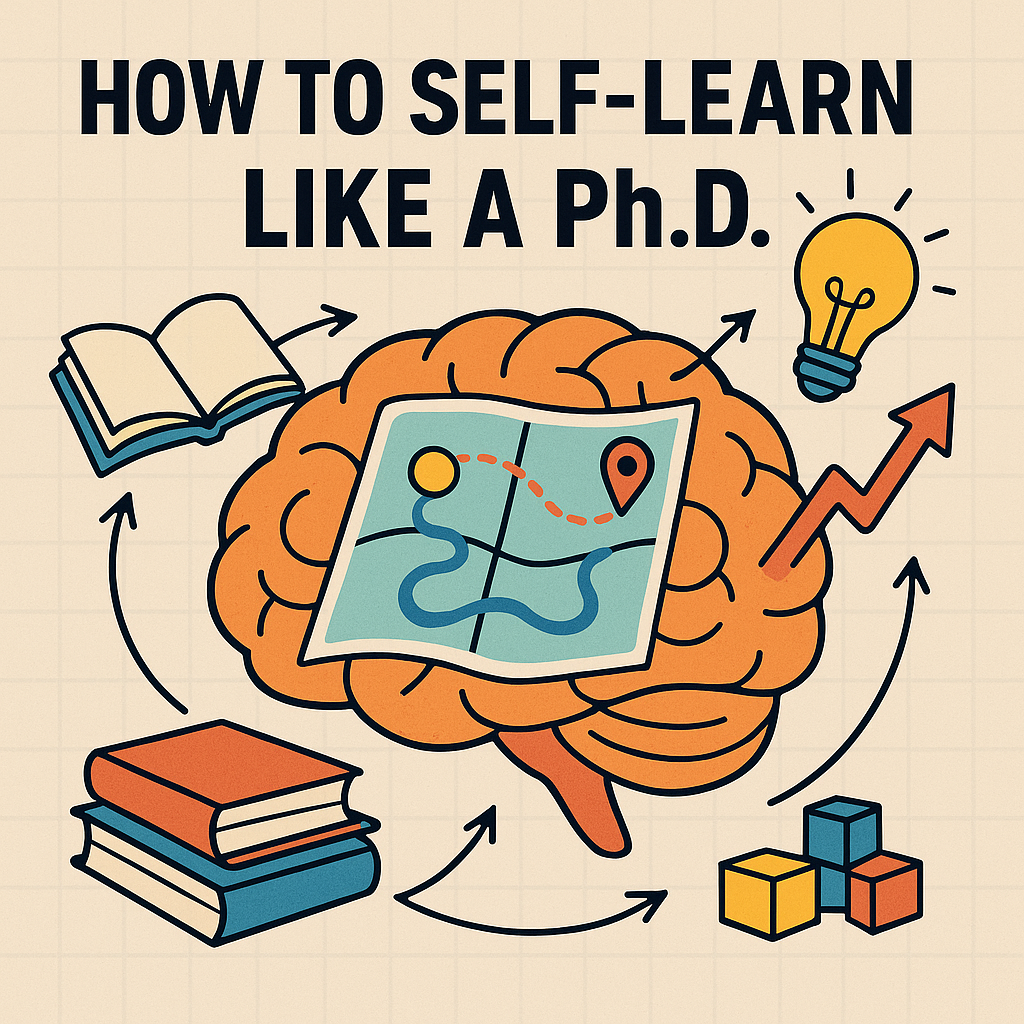How to Self-Learn Like a PhD: The Skill Nobody Talks About

Most people think PhD students are just “super smart.”
But the real secret? They’re expert learners.
A PhD trains you to take a completely unfamiliar topic and go from confusion to mastery—rapidly. Over the years, I’ve watched this process work like a superpower, and today I’m breaking it down into a practical system you can use.
Here’s how to learn like a PhD in 5 steps.
🎯 Step 1: Start with Strong Motivation (Your “Why”)
Learning becomes effortless when it connects to a goal that matters.
When I was learning a language, it wasn’t for fun.
It was because I wanted to communicate with friends who didn’t speak English.
When I started my PhD—I’ll be honest, a part of it was just wanting to be called “Dr.”
Your motivation doesn’t have to be noble but just powerful.
If your “why” matters to you, you’ll push through the boring parts, the confusion, and the inevitable frustration.
🗺 Step 2: Don’t Find a Teacher—Find a Map
Forget the old-school classroom model where a single teacher guides you.
Instead, you need a curriculum roadmap—a structured path of topics.
One of the best tricks?
- Use MIT Open Courseware or Harvard Online
- Open a course related to what you want to learn
- Ignore the lectures—focus on the lecture topics
You’re not searching for content.
You want the outline experts use to master the field.
And if you're diving into a niche research topic:
Go to Google Scholar
Type:[topic] review article
A good review paper is like a treasure chest—a condensed, well-organized summary of everything you need to know.
🔥 Step 3: Follow Curiosity, Not Linear Order
This is where regular learners and PhD learners diverge.
Most people go:
- Step 1
- Step 2
- Step 3
… and get bored halfway through.
The best learners follow what sparks genuine interest.
If a subtopic catches your eye, chase it.
If another feels dull, skip it.
Keep a curiosity journal—write every question you have as you explore.
Those questions guide your learning in the most natural and satisfying way.
These transform learning from tedious consumption into active exploration.
📚 Step 4: Collect & Hoard Information
PhD learners don’t just “read things.”
They collect them.
We gather:
- review papers
- Wikipedia summaries
- expert papers
- books
- diagrams
- datasets
- names of key researchers
When you discover a researcher whose work resonates —follow them through Google Scholar and ResearchGate, read their other papers, and understand their perspective.
Tools like Zotero, EndNote, etc., help you manage the database.
You don’t need to understand everything immediately.
Just keep collecting and let understanding accumulate.
🧠 Step 5: Apply Knowledge Early and Often
This is crucial.
If you just read, you won’t retain.
Instead:
- summarize what you just learned in your own words
- draw a diagram from memory (You use tools like Goodnotes)
- write a short explanation
- teach the concept to someone else
Knowledge sticks when you use it.
The secret is getting out of “passive reading” and into “active output.”
And Here’s the Final Key: Learn Every Day
Even just 5–10 minutes.
Small consistent exposure changes the brain.
Cramming doesn’t.
Little steps daily beat heroic weekend marathons.
When you hit boredom or frustration—don’t switch topics.
Just switch mode:
- Try reading instead of writing
- Try teaching instead of reading
- Try diagramming instead of notetaking
Stay with the subject—just change the cognitive gear.
And finally…
Work With Your Energy & Environment
- If you think better in the morning — learn in the morning
- If your mind is sharp at night — learn at night
- If libraries calm you — go there
- If cafés stimulate you — use them
Success in learning isn’t just about discipline.
It’s about reducing friction.
Put yourself in the mode where learning is easiest.
Final Thought
PhD-level learning isn’t about being smarter —it’s about using better strategies.
- strong motivation
- structured maps
- curiosity-driven exploration
- information hoarding
- continual synthesis
- daily micro-learning
- mode-switching
- environmental optimization
Do these things and you’ll learn anything faster than you ever thought possible.
